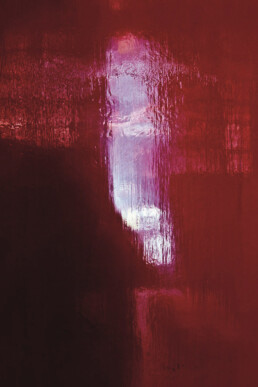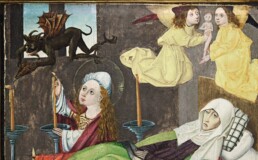POETRY ABEND ZUM STADTJUBILÄUM
Wehwalt Koslovsky. Manch einer nennt ihn „Legende“, manch anderer den „Mozart des Poetry Slams“. Klingt toll. Ist Quatsch. Und spielt auch wirklich keine Rolle.
Fest steht, dass der mittlerweile an der Nordsee gestrandete Bühnendichter aus Düsseldorf den Reim hierzulande wieder salonfähig gemacht hat. Am 20. Juli wird er im Rahmen des 750-jährigen Stadtjubiläums im Diözesanmuseum zu Rottenburg speziell für diesen Anlass verfasste Texte zum Besten geben. Das Motto des Abends lautet: „Drei Römer auf’m Bolzplatz“.
Herzliche Einladung an alle, die das Jubiläum unserer Stadt mitfeiern möchten.
Taube, Fisch und Auto – Ein überraschendes Trio
Wer kennt sie nicht – Aufkleber auf den Heckscheiben oder Kofferraumdeckeln mit allerlei bekannten oder unbekannten Abbildungen. Matthias Raidt hat davon auch welche entdeckt und erforscht deren Aussagen. Welche es sind? Einfach das Video schauen!
Schimmernde Tempel. Klösterliche Schatzkunst im Südwesten
Die Diözesankonservatorin und Leiterin des Diözesanmuseums Dr. Melanie Prange stellt in ihrem Vortrag »Schimmernde Tempel. Klösterliche Schatzkunst des Mittelalters im Südwesten« die Klosterschätze der Abteien Zwiefalten und Reichenau vor. Diese sind zentrale Beispiele für die mittelalterliche Schatzkunst in Südwestdeutschland.
In der Chronik des Mönchs Berthold (1137/38) wird die Kirche des Benediktinerklosters Zwiefalten als schimmernder Tempel bezeichnet. Es werden goldene Kronen, silberne, kristallene und elfenbeinerne Gefäße, Edelsteine und seidene Wandbehänge beschrieben. Mit ihrem reichen Schmuck vergegenwärtigte die Klosterkirche von Zwiefalten den Tempel des Himmlischen Jerusalems. Als himmlischer Abglanz machten die kostbaren Gefäße das sinnlich greifbar, was nicht greifbar ist: die Wirkmacht Gottes und der Heiligen.
Im Jahr der großen Landesausstellung »Welterbe des Mittelalters. 1300 Jahre Klosterinsel Reichenau« nimmt der Vortrag über die Schatzkunst eine Kunstgattung in den Blick, die für die Ausgestaltung der Liturgie, den Glaubenshorizont und das Selbstverständnis der Abteien grundlegend war. Vor dem Hintergrund eines über Jahrhunderte gesammelten Wissens entstanden in den Klöstern Objekte von herausragender Kunstfertigkeit und theologischer Aussagekraft, die bis heute staunen lassen.
Der Vortrag findet im Rahmen der 71. Jahrestagung der Kommission für geschichtliche Landeskunde in Baden-Württemberg statt.
Termin: Donnerstag, 27. Juni 2024 um 20 Uhr
Ort: Rottenburger Festhalle
Eintritt frei.
Projekt Zukunft für die Klöster
Zum Abschluss unserer Erlebniswoche KLOSTERLEBEN laden wir Sie herzlich zum Podiumsgespräch zum Thema Projekt Zukunft für die Klöster am Sonntag, 23. Juni 2024 um 15 Uhr ein.
Als Begegnungsorte von Glauben, Kunst und Wissenschaft waren Klöster über lange Zeit wichtige Impulsgeber für gesellschaftliche und spirituelle Erneuerungen. Heute befinden sich viele Orden in einem Transformationsprozess: Die Zahl der Klostereintritte geht zurück, viele Konvente müssen ihre angestammten Sitze aufgeben oder gar ihre Pforten schließen. Doch viele religiöse Gemeinschaften sehen in dieser Umbruchszeit auch eine Chance für einen Neubeginn. Welche neuen, bisher ungewohnten Wege ergeben sich für die Klöster? Im Gespräch mit Vertreter:innen unterschiedlicher Orden fragen wir danach, welche Rolle Klöster heute spielen und zukünftig spielen können.
Mit Generaloberin Schwester Maria Hanna Löhlein (Franziskanerinnen von Reute), Pater Alfred Tönnis OMI (Seelsorgeeinheit Bussen), Ulrike Rose und Sr. Josefa Thusbaß (Vorstand Zukunft Kulturraum Kloster e.V.)
Moderation: Dr. Melanie Prange (Leitung Diözesanmuseum)
|
|
Klöster (er)leben in Aufklärung, Säkularisation und Moderne
Zum Auftakt der Erlebniswoche KLOSTERLEBEN laden wir Sie herzlich zum Eröffnungsvortrag von Prof. Dr. Andreas Holzem (Katholisch-Theologische Fakultät der Universität Tübingen) am Sonntag, 16. Juni um 15 Uhr ein. Der Professor für Kirchengeschichte bietet einen historischen Rückblick zum Selbstverständnis und zur öffentlichen Wahrnehmung von Klöstern in der turbulenten Zeit zwischen Aufklärung, Säkularisation und Moderne.
Die Aufklärung ist für die großen Prälatenklöster des deutschen Südwestens einerseits eine gute Zeit: Engagiert wenden sie sich den neuen Leitwissenschaften zu und leisten Enormes für das höhere Bildungswesen wie für die Volksschule. Andererseits ist die Aufklärung für Klöster eine miserable Zeit: Gezielte öffentliche Herabwürdigung macht das Leben der Ordensleute lächerlich und bereitet die Säkularisation von 1803/06 ideologisch vor. Im 19. Jahrhundert, als der Ultramontanismus ‚Kulturkämpfe‘ auslöst, wird um die Klöster mit aller Schärfe gerungen: für die einen ein Hort des „Jesuitismus“, für die anderen eine neue Form für Bildung und soziales Engagement. Erst in der Zeit der Weimarer Republik verliert sich das Ideologische; Klöster werden zu Zentren eines intellektuellen Katholizismus und Sehnsuchtsorten abseits der Kämpfe um das demokratische Deutschland.
Referent: Prof. Dr. Andreas Holzem (Professor für Mittlere und Neuere Kirchengeschichte an der Katholisch-Theologischen Fakultät der Eberhard Karls Universität Tübingen)
|
Sprechendes Gold
Sprechendes Gold
Klösterliche Schatzkunst aus Zwiefalten
Die Intervention präsentiert zwei herausragende Stücke aus einem der altehrwürdigsten Kirchenschätze Süddeutschlands – dem Schatz der Benedektinerabtei Zwiefalten. In den Klosterwerkstätten am Fuße der Schwäbischen Alb enstanden schon seit dem hohen Mittelalter Goldschmiedearbeiten vom höchstem künstlerischen Rang, wie die prachtvolle Staurothek aus dem 11. Jahrhundert und ein Reliquienkreuz mit Bergkristallen aus dem 12. Jahrhundert. Der Glanz von Edelsteinen und kostbarem Metall wirft ein Schlaglicht auf die 700-jährige Geschichte dieser Abtei – von den bescheidenen Anfängen bis zur Blüte als Kunst- und Kulturzentrum des Mittelalters.
Die Intervention eröffnet am Samstag, 08. Juni, um 17 Uhr mit einem Rundgang zusammen mit Dr. Melanie Prange. Am Dienstag, 18. Juni, um 15 Uhr gibt es Gelegenheit zu einer weiteren Führung durch die Intervention.
Vergoldungsworkshop für Familien
Im Rahmen der Erlebniswoche KLOSTERLEBEN (16.06.-23.06.2024) widmet sich das Diözesanmuseum der reichen Rottenburger Klostertradition. Gewänder und Heiligenscheine von Figuren bekamen in den mittelalterlichen Klosterwerkstätten durch einen Überzug mit Blattgold den Glanz des Besonderen. In diesem Workshop zeigen wir, wie diese alte Technik funktioniert und vergolden unsere mitgebrachten Schätze.
Wer gerade kein Klosterwappen zur Hand hat, kann ein Lieblingsobjekt verzieren oder bekommt eine goldene Nase…
Mit Hans-Joachim Bleier (Feinschmied und Metallrestaurator, Rottenburg)
Für Kinder (ab 7 Jahre) und Familien
Bitte mitbringen: Ein kleines Objekt, das verschönert und vergoldet werden soll (z.B. eine Tasse), sowie ein kleines Vesper und etwas zu trinken
Wildkräuterwerkstatt im Museumsgarten
Im Rahmen der Erlebniswoche KLOSTERLEBEN (16.06.-23.06.2024) widmet sich das Diözesanmuseum der reichen Rottenburger Klostertradition. Im neu angelegten Museumsgarten – dem historischen Ort des ehemaligen Karmelitergartens – haben Sie die Möglichkeit, wilde Kräuter aus der Natur näher kennezulernen.
Süße Köstlichkeiten, eine schnelle erste Hilfe aus der Natur oder eine selbstgemachte Geschenkidee als Mitbringsel – Wildkräuter sind unglaublich vielseitig und können das ganze Jahr über genutzt werden. Im Workshop werden verschiedene Pflanzen und Rezepte vorgestellt und Tipps zum richtigen Sammeln gegeben. Gemeinsam stellen wir verschiedene Produkte zum Mitnehmen her und zaubern u.a. einen Mückenstich-Roll-on aus Spitzwegerich, ein Sommer-Oxymel und eine eigene Teemischung.
Mit der Bitte um verbindliche Voranmeldung; Teilnehmer:innenzahl bis maximal 16 Personen.
Workshopleitung: Theresa Ester-Nacke (Ernährungswissenschaftlerin M.Sc./Heilkräuterexpertin, Tübingen)
Stations of the Cross - Artist talk with Bernhard Langerock
Photographer Bernard Langerock has selected 15 works from his extensive photo series "Cross Phenomena" and compiled them into Stations of the Cross. In his texts, Dr Kurt-Peter Gertz, theologian and art historian, takes an associative look at the result of this work, a rare form of depiction of the Stations of the Cross in the art world.
The open combination of image and word gives viewers the opportunity to develop their own ideas and thoughts and to immerse themselves meditatively in the photographs.
The depiction of the Way of the Cross goes back to the "Via dolorosa", Jesus' historical path of suffering from his condemnation to his crucifixion on Calvary in Jerusalem.
The artist talks to Dr Melanie Prange about the exhibited works and the Stations of the Cross in the history of art and piety.
Bernard Langerock, Photo artist
Dr. Melanie Prange, Director of the Rottenburg Diocesan Museum, Diocesan Conservator
Thursday, 04.04.2024, 19:00 - 20:30
House of the Catholic Church, Stuttgart
Entrance free
Registration takes place via the homepage of the Katholisches Bildungswerk Stuttgart:
Registration "Stations of the Cross - Artist talk with Bernhard Langerock"
Further information on the "Stations of the Cross" exhibition can be found on the homepage of the Katholisches Bildungswerk Stuttgart:
https://www.kbw-stuttgart.de/veranstaltungen/290224-kreuzweg-stationen/
Gefährliche Bildwerke?!
Impulse zur Vermittlung von Kunstwerken mit diskriminierendem Potential
Bilder mit potentiell diskriminierenden Inhalten finden sich auch im kirchlichen Kontext. Gehören sie aus dem Sichtfeld verbannt - oder sorgsam vermittelt? Wie ist die Qualifizierung ‚diskriminierend‘ zu verstehen? Welche Ansätze methodischer wie sprachlicher Art passen? Und was bedeutet das für die inhaltliche Auseinandersetzung? Begleitend werden auf der Lernplattform Materialien zur Vorbereitung zur Verfügung gestellt. An zwei Bildtypen geht es um aktuelle Diskussionsbeispiele (Missionssammeldosen und die Darstellung der Drei Heiligen Könige).
Datum: Samstag, 4. Mai 2024, 9:30 bis 16:30 Uhr
Ort: Diözesanmuseum Rottenburg Karmeliterstraße 9, D – 72108 Rottenburg am Neckar,
Verantwortliche: Reinhard L. Auer, Dr.in Iris Dostal- Melchinger, Dr.in Nadine Niester, Christoph Schmitt
Anmeldung bitte direkt über das EJW www.ejw-bildung.de, ID FT16630324









